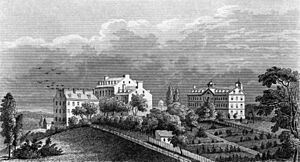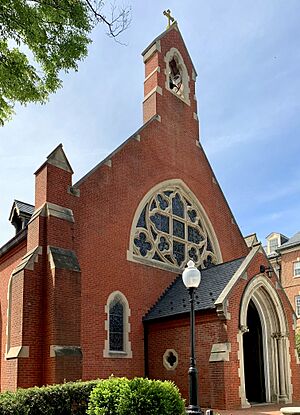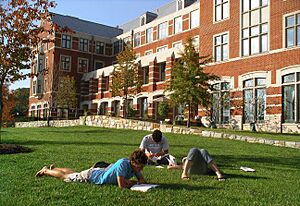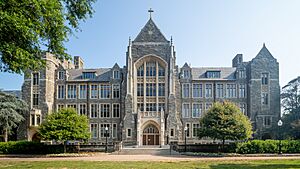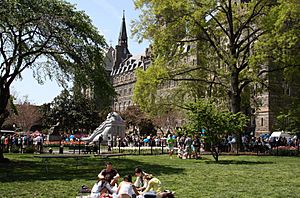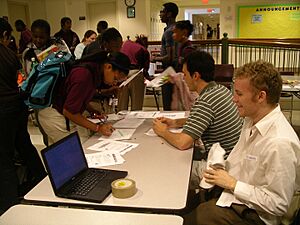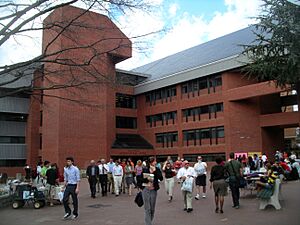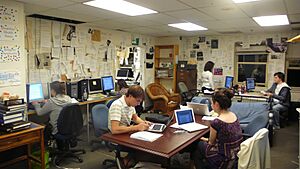Georgetown University facts for kids
 |
|
| Latin: Collegium Georgiopolitanum | |
|
Former names
|
Georgetown College (1789–1815) |
|---|---|
| Motto | Utraque Unum (Latin) |
|
Motto in English
|
"Both into One" |
| Type | Private federally chartered research university |
| Established | January 23, 1789 |
| Founder | John Carroll |
| Accreditation | MSCHE |
|
Religious affiliation
|
Catholic (Jesuit) |
|
Academic affiliations
|
|
| Endowment | $3.7 billion (2024) |
| Budget | $1.81 billion (FY2024) |
| President | Robert Groves (interim) |
|
Academic staff
|
Total: 2,610
|
|
Administrative staff
|
1,500 |
| Students | 19,005 |
| Undergraduates | 7,463 |
| Postgraduates | 11,542 |
| Location |
,
United States
38°54′26″N 77°4′22″W / 38.90722°N 77.07278°W |
| Campus | Large city, 104 acres (42 ha) |
| Colors | Blue and gray |
| Nickname | Hoyas |
|
Sporting affiliations
|
|
| Mascot | Jack the Bulldog |
 |
|
Georgetown University is a private university in Washington, D.C., United States. It was founded by Bishop John Carroll in 1789. It is the oldest Catholic college in the U.S. and the first university in the nation to be given a special charter by the federal government.
Georgetown has many different schools for both undergraduate (first degree) and graduate (advanced degree) students. Its main campus is in the historic Georgetown neighborhood. It sits on a hill above the Potomac River. The famous Healy Hall building helps people recognize the campus. The university offers degrees in many subjects. About 7,500 undergraduate and 10,000 graduate students from over 135 countries attend. The school's sports teams are called the Hoyas. The men's basketball team is part of the Big East Conference.
Many famous people have graduated from Georgetown. These include scholars, billionaires, U.S. governors, Supreme Court justices, U.S. presidents, and members of Congress. It has also educated many U.S. diplomats and foreign leaders.
Contents
History of Georgetown University
How Georgetown University Started
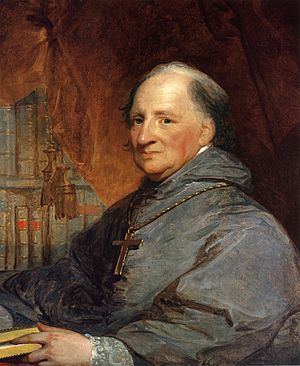
In 1634, Jesuit settlers from England started the Province of Maryland. During colonial times, Catholic schools were often secret. After the American Revolutionary War, people wanted to create a lasting Catholic school in the U.S.
Pope Pius VI chose John Carroll to lead the Catholic Church in the U.S. In 1789, Carroll bought land in Georgetown. The first student, William Gaston, enrolled in November 1791. Classes began in January 1792.
Growth in the 1800s
In its early years, Georgetown College faced money problems. The Jesuit order helped the school in 1805. To raise money for Georgetown and other schools in 1838, the Maryland Jesuits sold enslaved people from their lands. This ended their practice of slaveholding.
In 1815, President James Madison signed a law giving Georgetown a special charter. This allowed it to give out degrees. The first bachelor's degrees were given two years later. In 1844, the school received another charter. The Medical School opened in 1851.
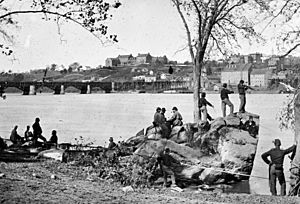
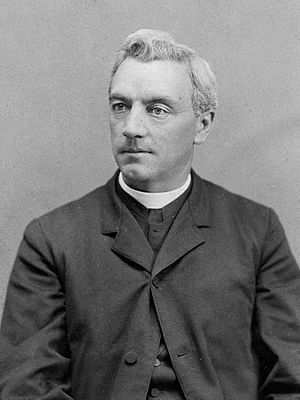
The American Civil War greatly affected Georgetown. Many students and alumni joined the armies. The Union Army used university buildings to protect Washington, D.C. Enrollment stayed low after the war.
Enrollment grew again in the late 1800s. This was during the time of President Patrick Francis Healy (1873-1881). Healy was the first person of African descent to lead a mostly white American university. He improved the school's programs and created the Alumni Association. He also oversaw the building of Healy Hall, which is named after him. Healy is known as the school's "second founder."
Georgetown in the 1900s
In 1901, the School of Medicine added a dental school. The undergraduate School of Nursing opened in 1903.
The Walsh School of Foreign Service (SFS) started in 1919. It prepared students for careers in diplomacy and international business. The McDonough School of Business (MSB) became a separate school in 1957.
Georgetown also started admitting more women. The School of Nursing always had female students. By 1952, most university classes were open to women. The College of Arts and Sciences welcomed its first female students in 1969. This made Georgetown fully coeducational.
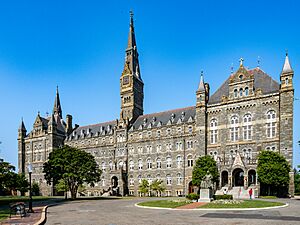
Georgetown in the 2000s
In 2003, Georgetown finished a fundraising campaign. It raised over $1 billion for student aid and new projects.
In 2005, the School of Foreign Service in Qatar opened in Education City. This campus offers programs for students in the region. Georgetown also received a large gift from Prince Alwaleed bin Talal. This gift helped expand the Prince Alwaleed Bin Talal Center for Muslim-Christian Understanding.
John J. DeGioia was Georgetown's first president who was not a Jesuit. He led the school from 2001 to 2024. He focused on improving finances and promoting understanding between different cultures and religions.
Jesuit Traditions
Georgetown University was founded by former Jesuits. It follows the traditions of Ignatius of Loyola. It is part of the Association of Jesuit Colleges and Universities. Many Jesuits live on campus and work as professors or administrators. Jesuit Heritage Week is held every year to celebrate their contributions.
Academics and Learning
| School | Founded |
|---|---|
| College of Arts & Sciences | 1789 |
| Graduate School of Arts & Sciences | 1820 |
| School of Medicine | 1851 |
| Law Center | 1870 |
| School of Nursing | 1903 |
| Walsh School of Foreign Service | 1919 |
| School of Dentistry (closed) | 1951 |
| School of Continuing Studies | 1956 |
| McDonough School of Business | 1957 |
| School of Languages and Linguistics (closed) | 1959 |
| Georgetown University in Qatar | 2005 |
| McCourt School of Public Policy | 2013 |
| School of Health | 2022 |
| References: | |
As of 2017, Georgetown had about 7,463 undergraduate students and 11,542 graduate students. Bachelor's degrees are offered through several schools. These include the College of Arts & Sciences and the Walsh School of Foreign Service.
Master's and doctoral degrees are offered through the Graduate School of Arts & Sciences, the Law Center, and the School of Medicine. The School of Foreign Service is well-known for its international affairs programs.
Admissions and Rankings
| ARWU World | 501–600 |
|---|---|
| THES World | 201–250 |
| USNWR National University | 24 (tie) |
| Washington Monthly National University | 15 |
| Forbes | 32 |
| Admissions statistics | |
|---|---|
|
2021 entering
classChange vs. 2016 |
|
| Admit rate | 11.7%
(
|
| Yield rate | 48.4%
(
|
| Test scores middle 50% | |
| SAT EBRW | 700–770 |
| SAT Math | 690–780 |
| ACT Composite | 32–34 |
| High school GPA† | |
| Top 10% | 87% |
| Top 25% | 97% |
| Top 50% | 99% |
|
|
Getting into Georgetown is very competitive. For the Class of 2025, only 11.7% of applicants were accepted. The School of Foreign Service's international relations programs are ranked among the best in the world. The Law Center is also highly ranked in the U.S.
Most students accepted to Georgetown are in the top 10% of their high school class. Over 55% of undergraduates receive financial aid. The university helps students pay for their education based on their financial need.
Professors and Teachers

Georgetown University has many full-time and part-time professors. The faculty includes leading experts and important political and business leaders. Many former politicians teach at Georgetown. These include former Secretaries of State Madeleine Albright and Henry Kissinger. Former Supreme Court Justices have also taught there.
Research and Discoveries
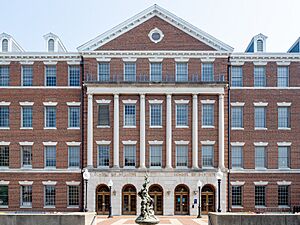
Georgetown University is known for its high level of research activity. Its libraries hold millions of books and e-books. Professors do research in many areas. Key research areas include religion, ethics, science, public policy, and cancer medicine.
In 2019, Georgetown spent $240.9 million on research. The Georgetown Lombardi Comprehensive Cancer Center is a major cancer research center. It helped develop the important HPV vaccine for cervical cancer.
Campus Life
Georgetown University Campuses
Georgetown University has four campuses in Washington, D.C. The main campus is in the Georgetown neighborhood. It includes the undergraduate campus and the Medical Center. Other campuses are the School of Continuing Studies (in Chinatown) and the Law Center.
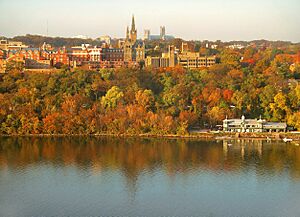
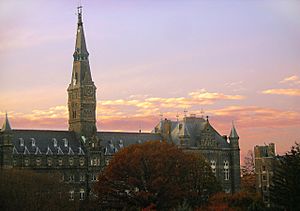
The main campus is on a hill above the Potomac River. This is why Georgetown is often called "The Hilltop." The campus has 54 buildings and student housing. Most buildings have a collegiate Gothic or Georgian brick style. Healy Hall is the most famous building. It is a National Historic Landmark.
The Law Center campus is in the Capitol Hill neighborhood. The School of Continuing Studies campus is in downtown Washington, D.C. Georgetown also has campuses in Doha, Qatar, and Jakarta, Indonesia. It also has study centers in Italy and Turkey.
Student Life and Activities
Most Georgetown students come from outside Washington, D.C. About 11% are international students. Many students live on campus, especially younger students.
Even though it's a Jesuit university, students come from many different religious backgrounds. Georgetown has a full-time rabbi, an imam, and a Hindu priest. The university supports many student groups for different faiths.
Student Groups and Organizations
Most Georgetown students are involved in at least one of the many student organizations. These groups cover interests like student government, sports clubs, media, performing arts, and volunteering.
Some of the oldest groups include the Philodemic Society, a debating club founded in 1830. The Mask and Bauble Dramatic Society is the oldest university theater group. The Model United Nations team is often ranked among the best in the world.
Georgetown also has several student-run businesses. Students of Georgetown, Inc. ("The Corp") runs coffee shops and grocery stores on campus. The Georgetown University Alumni & Student Federal Credit Union is the largest student-run credit union in the U.S.
The Georgetown Emergency Response Medical Service ("GERMS") is an all-volunteer ambulance service. The Army Reserve Officer Training Corps (ROTC) unit, the Hoya Battalion, is the oldest military unit in D.C.
Student Activism
Georgetown students are very active in social justice issues. Groups like Take Back the Night protest against violence. The Georgetown Solidarity Committee works for workers' rights. Georgetown Students for Fair Trade helped make sure all campus coffee is Fair Trade Certified.
Georgetown has a politically active student body. Student political organizations are popular. The Georgetown University College Republicans and College Democrats are active on campus.
The university also has groups focused on sustainability and environmentalism. GU Fossil Free worked to encourage the university to stop investing in fossil fuels. In February 2020, Georgetown announced it would fully remove its investments from fossil fuels.
Campus Media
Georgetown University has several student-run newspapers and journals. The Hoya is the oldest newspaper, published twice a week. The Georgetown Voice is a newsmagazine that covers city and national issues. The Georgetown Law Weekly is the student paper for the Law Center.
Other publications include the Georgetown Journal of International Affairs, which shares views on global topics. The Georgetown Heckler is a humor magazine.
The university has a television station, GUTV. WGTB is Georgetown's radio station, available online.
Sports and Athletics
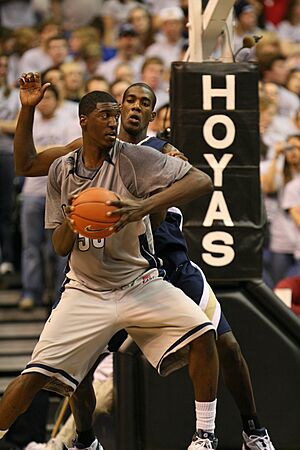
Georgetown has 23 varsity sports teams and 23 club teams. The varsity teams compete in the NCAA's Division I. Most sports are part of the Big East Conference. The football team plays in the Patriot League.
In 2002, U.S. News & World Report ranked Georgetown's athletics program among the top 20 in the nation. Many student athletes have gone on to play professionally.
The school's teams are called "Hoyas." This name comes from an old Greek and Latin chant, "Hoya Saxa," which means "what rocks."
The men's basketball team is very successful. It won the NCAA championship in 1984. The team has won the most Big East conference tournament titles.
The sailing team has won 14 national championships since 2001. Georgetown has also been successful in cross country and track and field. In 2011, the women's cross country team won a national championship. The men's soccer team won a national championship in 2019.
People of Georgetown
Career Paths and Achievements
Most Georgetown graduates start working right after college. Many also go on to get advanced degrees in law, medicine, or business. Georgetown alumni have won many prestigious scholarships. These include 32 Rhodes Scholarships and 565 Fulbright Scholars. Georgetown is also one of the top universities for sending volunteers to the Peace Corps.
Graduates of the McDonough School of Business often have high starting salaries. Georgetown alumni generally have high earnings throughout their careers.
Government and international relations are popular majors. Many graduates work in politics and diplomacy. Over 450 alumni work on Capitol Hill. Georgetown has educated more U.S. diplomats than any other university. Twelve foreign heads of state have graduated from Georgetown.
Many alumni also work in finance and consulting. Georgetown is among the top universities for employees on Wall Street.
Famous Alumni and Faculty
Bill Clinton, the 42nd President of the United States, graduated from the School of Foreign Service in 1968. Other famous alumni include former U.S. Cabinet members like Robert Gates (Secretary of Defense) and Jack Lew (Secretary of the Treasury). Jerome Powell, the head of the Federal Reserve, also attended Georgetown.
Alumnus Jan Karski was a World War II resistance fighter. He was one of the first to tell the world about the terrible events of the Holocaust.
In the U.S. Congress, many alumni hold important leadership roles. These include Hakeem Jeffries, John Barrasso, and Dick Durbin. Over 100 alumni have served in Congress. Two former U.S. Supreme Court Justices, Antonin Scalia and Edward Douglass White, were also alumni.
Twelve foreign heads of state have graduated from Georgetown. These include King Felipe VI of Spain and King Abdullah II of Jordan. Presidents from Colombia, Ecuador, Panama, El Salvador, Costa Rica, and the Philippines also attended.
In business, famous alumni include billionaires like Frank McCourt (real estate) and Ted Leonsis (sports). Other important business leaders include Mary Callahan Erdoes of JPMorgan Chase.
Georgetown alumni in journalism have won major awards like the Pulitzer Prize. In the arts, famous alumni include Academy Award-winning screenwriter William Peter Blatty, whose novel The Exorcist was set on campus. Filmmaker Bradley Cooper has been nominated for many Academy Awards.
See also
 In Spanish: Universidad de Georgetown para niños
In Spanish: Universidad de Georgetown para niños


